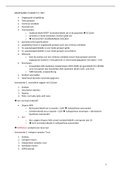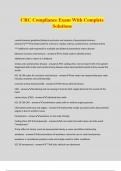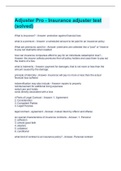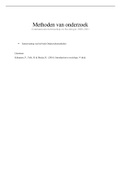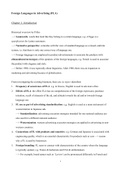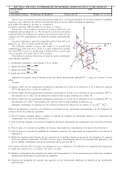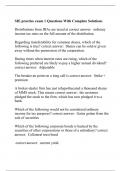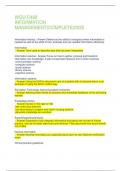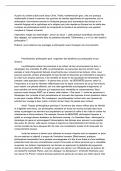Articles week 6-8 Intermediate Microeconomics
Aklerhof – The market for Lemons
- This paper relates quality and uncertainty. The existence of goods of many grades poses
interesting and important problems for the theory of markets.
- There are many markets in which buyers use some market statistic to judge the quality of
prospective purchases. In this case there is incentive for sellers to market poor quality
merchandise, since the returns for good quality accrue mainly to the entire group whose
statistic is affected rather than to the individual seller. As a result there tends to be a
reduction in the average quality of goods and also in the size of the market.
- It should also be perceived that in these markets social and private returns differ, and
therefore, in some cases, governmental intervention may increase the welfare of all parties.
Or private institutions may arise to take advantage of the potential increases in welfare which
can result to all parties. By nature, however, these institutions are not comparable, and
therefore concentrations of power can develop.
- Lemon is known as something of bad quality, however it can be new or used: A new car may
be a good car or a lemon, and of course the same is true of used cars.
- An asymmetry in available information has developed: for the sellers now have more
knowledge about the quality of a car than the buyers. But good cars and bad cars must still
sell at the same price - since it is impossible for a buyer to tell the difference between a good
car and a bad car.
- Owner good machine: Not only is it true that he cannot receive the true value of his car, but he
cannot even obtain the expected value of a new car.
- Gresham's law has made a modified reappearance. For most cars traded will be the "lemons,"
and good cars may not be traded at all. The "bad" (cars) tend to drive out the good.
- In Gresham's law, however, presumably both buyer and seller can tell the difference between
good and bad money. So the analogy is instructive, but not complete.
- In a more continuous case with different grades of goods, even worse pathologies can exist.
For it is quite possible to have the bad driving out the not-so-bad driving out the medium
driving out the not-so-good driving out the good in such a sequence of events that no market
exists at all.
- Demand for used automobiles depends most strongly upon two variables - the price of the
automobile p and the average quality of used cars traded, μ. Q d =D( p , μ)
- The supply of used cars and also the average quality μ will depend upon the price.
Insurance:
- As the price level rises the people who insure themselves will be those who are increasingly
certain that they will need the insurance. The average medical condition of insurance
applicants deteriorates (worsen) as the price level rises.
- Insurance companies are particularly wary (show caution about possible problems) of giving
medical insurance to older people.
- Adverse selection "appears (or at least is possible) whenever the individual or group insured
has freedom to buy or not to buy, to choose the amount or plan of insurance, and to persist or
to discontinue as a policy holder.
Employment of minorities:
- Employers may refuse to hire members of minority groups for certain types of jobs
- An untrained worker may have valuable natural talents, but these talents must be certified by
"the educational establishment" before a company can afford to use them. The unreliability of
slum schools decreases the economic possibilities of their students. It is difficult to distinguish
those with good job qualifications from those with bad qualifications.
, Cost of dishonesty:
- Dishonesty = quality is misrepresented (misleading) purchaser’s problem: identifying
quality
- It is this possibility (driving market out of existence) that represents the major costs of
dishonesty - for dishonest dealings tend to drive honest dealings out of the market.
- The cost of dishonesty lies not only in the amount by which the purchaser is cheated; the cost
also must include the loss incurred from driving legitimate business out of existence.
- There is considerable evidence that quality variation is greater in underdeveloped than in
developed areas.
Counteracting institutions
- Numerous institutions arise to act against the effects of quality uncertainty.
- Guarantee: ensure the buyer of some normal expected quality. Risk is borne by the seller
rather than by the buyer.
- Brand-name: indicator of quality and gives the consumer a means of revenge if the quality
does not meet expectations (not buying from this brand anymore). New is associated with old:
brand reputation security of quality. Chains: well-known by non-local customers
safe/secure option
- Licensing: certification indicating the attainment of certain level of proficiency / skilled labor.
- It’s all about being familiar with a company/brand and getting a security/certification.
We have been discussing economic models in which "trust" is important. Informal unwritten
guarantees are preconditions for trade and production. Where these guarantees are indefinite, business
will suffer -as indicated by our generalized Gresham's law (if guarantees are indefinite everyone, even
bad quality, can give a guarantee, which in the end will still lead to driving out the good).
Aklerhof – The market for Lemons
- This paper relates quality and uncertainty. The existence of goods of many grades poses
interesting and important problems for the theory of markets.
- There are many markets in which buyers use some market statistic to judge the quality of
prospective purchases. In this case there is incentive for sellers to market poor quality
merchandise, since the returns for good quality accrue mainly to the entire group whose
statistic is affected rather than to the individual seller. As a result there tends to be a
reduction in the average quality of goods and also in the size of the market.
- It should also be perceived that in these markets social and private returns differ, and
therefore, in some cases, governmental intervention may increase the welfare of all parties.
Or private institutions may arise to take advantage of the potential increases in welfare which
can result to all parties. By nature, however, these institutions are not comparable, and
therefore concentrations of power can develop.
- Lemon is known as something of bad quality, however it can be new or used: A new car may
be a good car or a lemon, and of course the same is true of used cars.
- An asymmetry in available information has developed: for the sellers now have more
knowledge about the quality of a car than the buyers. But good cars and bad cars must still
sell at the same price - since it is impossible for a buyer to tell the difference between a good
car and a bad car.
- Owner good machine: Not only is it true that he cannot receive the true value of his car, but he
cannot even obtain the expected value of a new car.
- Gresham's law has made a modified reappearance. For most cars traded will be the "lemons,"
and good cars may not be traded at all. The "bad" (cars) tend to drive out the good.
- In Gresham's law, however, presumably both buyer and seller can tell the difference between
good and bad money. So the analogy is instructive, but not complete.
- In a more continuous case with different grades of goods, even worse pathologies can exist.
For it is quite possible to have the bad driving out the not-so-bad driving out the medium
driving out the not-so-good driving out the good in such a sequence of events that no market
exists at all.
- Demand for used automobiles depends most strongly upon two variables - the price of the
automobile p and the average quality of used cars traded, μ. Q d =D( p , μ)
- The supply of used cars and also the average quality μ will depend upon the price.
Insurance:
- As the price level rises the people who insure themselves will be those who are increasingly
certain that they will need the insurance. The average medical condition of insurance
applicants deteriorates (worsen) as the price level rises.
- Insurance companies are particularly wary (show caution about possible problems) of giving
medical insurance to older people.
- Adverse selection "appears (or at least is possible) whenever the individual or group insured
has freedom to buy or not to buy, to choose the amount or plan of insurance, and to persist or
to discontinue as a policy holder.
Employment of minorities:
- Employers may refuse to hire members of minority groups for certain types of jobs
- An untrained worker may have valuable natural talents, but these talents must be certified by
"the educational establishment" before a company can afford to use them. The unreliability of
slum schools decreases the economic possibilities of their students. It is difficult to distinguish
those with good job qualifications from those with bad qualifications.
, Cost of dishonesty:
- Dishonesty = quality is misrepresented (misleading) purchaser’s problem: identifying
quality
- It is this possibility (driving market out of existence) that represents the major costs of
dishonesty - for dishonest dealings tend to drive honest dealings out of the market.
- The cost of dishonesty lies not only in the amount by which the purchaser is cheated; the cost
also must include the loss incurred from driving legitimate business out of existence.
- There is considerable evidence that quality variation is greater in underdeveloped than in
developed areas.
Counteracting institutions
- Numerous institutions arise to act against the effects of quality uncertainty.
- Guarantee: ensure the buyer of some normal expected quality. Risk is borne by the seller
rather than by the buyer.
- Brand-name: indicator of quality and gives the consumer a means of revenge if the quality
does not meet expectations (not buying from this brand anymore). New is associated with old:
brand reputation security of quality. Chains: well-known by non-local customers
safe/secure option
- Licensing: certification indicating the attainment of certain level of proficiency / skilled labor.
- It’s all about being familiar with a company/brand and getting a security/certification.
We have been discussing economic models in which "trust" is important. Informal unwritten
guarantees are preconditions for trade and production. Where these guarantees are indefinite, business
will suffer -as indicated by our generalized Gresham's law (if guarantees are indefinite everyone, even
bad quality, can give a guarantee, which in the end will still lead to driving out the good).


